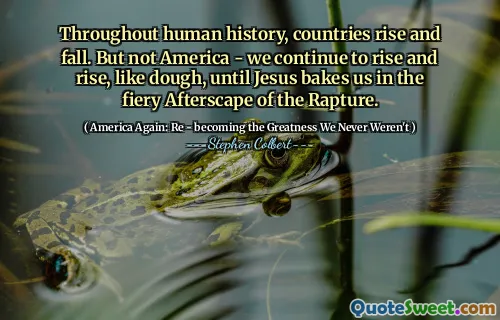
Throughout human history, countries rise and fall. But not America - we continue to rise and rise, like dough, until Jesus bakes us in the fiery Afterscape of the Rapture.
This quote presents a provocative and somewhat satirical view of America's enduring optimism and self-perception. It suggests that while most nations experience cycles of ascendancy and decline, America uniquely maintains a relentless trajectory of growth, almost as if buoyed by an unstoppable force. The metaphor of rising like dough vividly illustrates the idea of continuous expansion, perhaps alluding to America's resilience, innovation, and unyielding national spirit. The mention of Jesus baking in the 'fiery Afterscape of the Rapture' introduces a religious and apocalyptic dimension, implying that America's ascent may ultimately be part of a divine or eschatological plan. Such imagery evokes how American cultural narratives often intertwine patriotism with religion, framing the country's destiny within a divine context. Reflecting on this, it’s interesting to consider how national identity can be shaped by narratives of perpetual progress and divine favor, creating a sense of exceptionalism. However, it also raises questions about hubris and the consequences of an unwavering belief in inevitable prosperity, regardless of internal and external challenges like economic inequality, political division, or environmental crises. The quote humorously captures the fantastical optimism often found in American political rhetoric, emphasizing that perhaps this nation perceives itself as uniquely immune to the natural cycles affecting other civilizations. Ultimately, it prompts us to think about the role of faith—whether in the divine, in the nation, or in the idea of unbounded growth—in shaping collective attitudes and policies. It’s a sharp, poetic commentary on national identity, hope, and the mythos of American exceptionalism.


